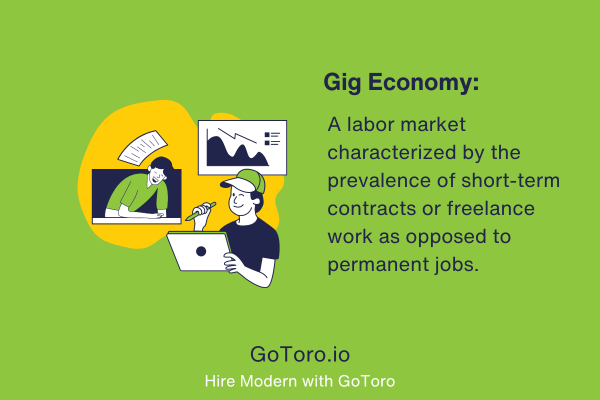The Gig Economy and Recruitment: A Rapid Transformation
The gig economy is rapidly transforming the modern labor market, with more people than ever opting for temporary or freelance roles over traditional full-time positions. As companies seek to adapt to the changing demands of workers, recruitment strategies are also evolving. Businesses are now looking beyond conventional employment models, recognizing that the gig economy offers unique opportunities for both flexibility and growth.
In today’s workforce, the rise of the gig economy and recruitment challenges are inextricably linked, as businesses must navigate the delicate balance of sourcing skilled, temporary workers while maintaining continuity and retention among their full-time staff.
What is the Gig Economy and How it Impacts Recruitment?

The gig economy encompasses freelance and temporary employment, where workers take on short-term projects or “gigs” rather than committing to long-term, traditional jobs. These types of jobs are becoming increasingly common in various sectors, including transportation, technology, and creative industries.
For recruitment, the gig economy presents both opportunities and challenges. On one hand, it allows companies to access a wider talent pool and meet short-term needs without long-term commitments. On the other, it requires businesses to rethink traditional recruitment strategies to engage and retain a workforce that values autonomy and flexibility.
Why the Gig Economy Matters for Both Workers and Employers
The gig economy is important for both workers and employers due to a variety of factors. For workers, gig jobs offer the ability to manage their own time, choose projects that align with their skills or interests, and even work across multiple industries. Employers, meanwhile, benefit from the ability to quickly fill roles in response to fluctuating demands, particularly during periods of economic uncertainty or industry-specific trends.
For recruitment efforts, businesses must understand that the rise of gig jobs is not just a trend, but a permanent shift in how work is structured. Flexibility, economic conditions, and technological advancements are all major drivers of this shift, making it crucial for employers to adjust their recruitment strategies accordingly.
Adapting Recruitment and Retention Strategies in the Gig Economy
As gig jobs rise, businesses must adapt their recruitment and retention strategies to accommodate this evolving workforce. Recruitment in the gig economy is no longer about simply filling positions but creating a flexible, dynamic work environment where gig workers feel valued.
To remain competitive, companies should focus on both attracting skilled gig workers and retaining them through innovative approaches such as offering competitive pay, flexible schedules, and opportunities for continued engagement. The gig economy and recruitment are becoming increasingly intertwined as companies seek to balance the benefits of temporary employment with the need for stability and long-term growth.
The Rise of Gig Jobs and Temporary Employment

Flexibility Drives Gig Economy and Recruitment Strategies
One of the key reasons for the surge in gig jobs and temporary employment is the flexibility they offer. Workers today value the ability to choose when and where they work, allowing them to balance professional commitments with personal responsibilities, such as education, caregiving, or personal projects.
For recruitment teams, this shift toward flexibility means adjusting their strategies to appeal to workers who prioritize autonomy over traditional job security. Gig economy recruitment now focuses on finding workers who are adaptable, skilled, and ready to engage in short-term roles, while ensuring they feel supported during their time with the company.
Technological Advancements in Gig Economy Recruitment
Technological platforms like Uber, Upwork, and TaskRabbit have revolutionized how workers find gig jobs, and how companies source talent. These platforms offer employers access to a broad pool of skilled workers, often in real-time, allowing businesses to quickly meet demand without the lengthy processes associated with traditional hiring.
For companies involved in gig economy recruitment, leveraging technology is essential for staying competitive. AI-driven platforms, job-matching algorithms, and data analytics now play a significant role in recruitment, streamlining the process and ensuring the right candidates are matched with the right projects.
Economic Uncertainty Boosts the Appeal of Temporary Workers
During periods of economic uncertainty, businesses may be more inclined to hire temporary workers. This approach allows companies to meet short-term needs without committing to the long-term costs associated with full-time employees, such as benefits and pension plans.
The gig economy provides a safety net for employers, offering the flexibility to scale up or down based on market demands. For recruitment teams, this means constantly engaging with a pool of potential gig workers who can step in when needed, ensuring the company remains agile in the face of economic shifts.
Shifting Workforce Preferences and the Rise of Freelancing
Younger generations, particularly millennials and Gen Z, are showing a growing preference for gig jobs and freelance opportunities. These workers value autonomy, variety, and the chance to pursue multiple interests simultaneously.
Recruitment strategies must evolve to reflect this shift. The gig economy and recruitment trends now focus on offering roles that cater to these workers’ desire for independence while still ensuring they remain engaged and connected to the company’s broader goals. By offering diverse opportunities and flexible arrangements, companies can attract the best talent from the gig workforce.
Impact of the Gig Economy and Recruitment on Retention

As the gig economy reshapes the workforce, retention strategies are also evolving to keep pace. Temporary and gig workers require unique approaches, and companies that adapt to these changes will be better positioned to attract and retain talent in this new landscape. The gig economy and recruitment are becoming closely linked, particularly as businesses seek to build a pool of skilled, reliable workers while ensuring continuity in operations.
Focus on Gig Worker Experience in Recruitment and Retention
Companies are increasingly recognizing the importance of providing a positive experience for gig workers. Even though these workers are not permanent employees, their overall satisfaction can greatly impact a company’s reputation and its ability to attract future talent. A poor experience may lead to high turnover and negative reviews, which could deter prospective gig workers from applying.
To improve retention within the gig economy, recruitment efforts should focus on offering clear communication, adequate support, and recognition of gig workers’ contributions. This not only enhances the worker experience but also builds loyalty, encouraging gig workers to return for future projects.
Development of Hybrid Employment Models in the Gig Economy
The rise of the gig economy has prompted some companies to adopt hybrid employment models that combine elements of both temporary and permanent work. By offering a mix of stability and flexibility, businesses can attract workers who are drawn to the gig economy’s autonomy but also seek the security of long-term employment.
For example, companies may offer gig workers the opportunity to transition into permanent roles or provide benefits traditionally reserved for full-time employees, such as health insurance or retirement plans. This hybrid approach helps bridge the gap between gig economy recruitment and long-term retention, providing a pathway for gig workers to become integral parts of the workforce.
Continuous Engagement as a Retention Strategy in the Gig Economy
One of the most effective strategies for retaining gig workers is maintaining continuous engagement. Unlike traditional employees, gig workers may only interact with a company for a short period. However, keeping gig workers engaged during and after their assignments can encourage them to return for future opportunities.
Continuous engagement involves offering ongoing training, networking opportunities, and performance incentives that encourage loyalty. By investing in these efforts, companies ensure that their pool of gig workers remains motivated and ready to step in when needed. This approach is especially important in gig economy recruitment, where retaining a skilled and reliable workforce is critical to success.
Adapting Traditional Retention Strategies to the Gig Economy
Companies are also adapting traditional retention strategies to fit the needs of the gig economy. Offering competitive pay, flexible work arrangements, and opportunities for skill development are essential in retaining temporary or project-based workers.
While full-time employees may value long-term benefits like career progression and job security, gig workers prioritize flexibility, autonomy, and the ability to take on diverse projects. Therefore, businesses must shift their focus to meet these expectations, ensuring that their gig workers feel valued even in short-term roles.
Addressing Challenges with Workforce Continuity in the Gig Economy
High turnover is one of the defining characteristics of the gig economy, and it presents significant challenges for businesses that rely on temporary workers. Workforce continuity can be disrupted as workers move from one gig to another, leading to a loss of institutional knowledge and creating operational inefficiencies.
To mitigate these challenges, organizations are investing in knowledge management systems that ensure critical information is documented and easily accessible. This allows companies to maintain continuity even as gig workers come and go. By having these systems in place, businesses can ensure smoother transitions between temporary workers while maintaining operational consistency—a key consideration for gig economy recruitment and retention.
Strategic Considerations for Employers Navigating the Gig Economy and Recruitment

As the gig economy continues to grow, companies must adapt their recruitment and retention strategies to meet the evolving needs of both temporary and full-time workers. By implementing effective strategies, businesses can leverage the advantages of gig work while maintaining stability and long-term growth. The gig economy and recruitment are now intertwined, making it crucial for employers to approach this shift with a well-rounded strategy.
Embrace Flexibility in Gig Economy Recruitment
To remain competitive in today’s gig economy, employers must embrace flexibility. Offering flexible work arrangements is key to attracting both full-time employees and gig workers. This could involve offering remote work options, flexible hours, or project-based contracts that allow workers to balance multiple jobs or commitments.
Flexibility not only appeals to workers but also allows companies to scale their workforce based on immediate needs, giving them the agility to respond to changing market conditions. Adapting recruitment strategies to offer flexibility is essential in a gig economy where autonomy is highly valued.
Leverage Technology for Gig Worker Recruitment and Engagement
In the gig economy and recruitment landscape, technology plays a vital role in efficiently sourcing, engaging, and retaining workers. Employers should leverage recruitment platforms, AI, and data analytics to quickly match the right talent with the right projects. These tools streamline the recruitment process, allowing companies to engage with a broad pool of gig workers in real time.
By incorporating technology into their recruitment strategies, companies can not only find the best talent but also improve gig worker retention by maintaining continuous engagement through digital platforms. This ensures that skilled workers remain connected to the business and are more likely to return for future gigs.
Cultivate a Strong Employer Brand in the Gig Economy
Even within the gig economy, a strong employer brand is essential for attracting and retaining gig workers. Recruitment strategies should emphasize the company’s commitment to inclusivity, innovation, and worker well-being, ensuring that gig workers feel valued and appreciated.
A positive employer brand helps businesses stand out in a competitive gig economy and creates a strong foundation for ongoing recruitment. When workers—whether temporary or full-time—feel a connection to the company’s mission and values, they are more likely to remain engaged and motivated. For companies navigating gig economy recruitment, maintaining a consistent and appealing employer brand is crucial.
Invest in Gig Worker Engagement and Development
To successfully recruit and retain talent in the gig economy, employers must invest in gig worker engagement. Gig workers should be treated as valuable members of the workforce, with opportunities for professional growth and recognition for their contributions.
Offering ongoing training, providing mentorship opportunities, and acknowledging achievements are powerful ways to foster loyalty among gig workers. These investments not only increase worker satisfaction but also encourage gig workers to return for future projects. Engaging with gig workers in a meaningful way can significantly boost retention rates in the gig economy and recruitment space.
Balance Short-Term Needs with Long-Term Recruitment Goals
While gig workers provide valuable short-term solutions, businesses should also focus on building a stable core of permanent employees. Balancing immediate needs with long-term goals allows companies to stay agile while maintaining institutional knowledge and continuity.
A successful gig economy and recruitment strategy ensures that companies can meet fluctuating demands without sacrificing the stability that comes from a dedicated full-time workforce. By aligning gig recruitment with long-term talent development, employers can create a sustainable workforce that thrives in both short-term projects and long-term business growth.
The rise of gig jobs has reshaped recruitment and retention strategies, pushing companies to embrace flexibility, leverage technology, and balance short-term needs with long-term goals. As the gig economy continues to evolve, businesses that adapt will thrive in this agile workforce. While challenges exist, such as high turnover, the gig economy offers opportunities for innovation in recruitment. Employers should focus on creating positive experiences for gig workers while building strategies that support both their temporary and full-time employees, ensuring success in a dynamic labor market.


